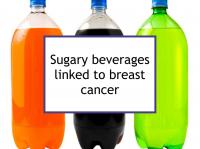Frequent consumption of sugar-sweetened beverages or sugary sweets is associated with increased breast cancer risk. This is true even for women who are not overweight or insulin resistant. Now a new study has reported that premenopausal women who have at least one sugar-sweetened beverage daily have higher risk of breast cancer.
Sugar-sweetened beverages heighten BC risk
Several studies have reported that childhood intake of sugar-sweetened beverages is associated with early menarche (first period), which in turn has been linked to increased breast cancer risk in adulthood. These results hold both for sucrose-sweetened and high-fructose corn syrup-sweetened sodas. High-fructose corn syrup is used more often as a sweetener in U.S. sodas.
Sweetened soda consumption increases the level of circulating estrogen, another known risk factor for breast cancer. High consumption of sugar-sweetened beverage or foods is also associated with increased breast density, still another breast cancer risk factor.
Latest research links sugary beverages to breast cancer
The Mexican case-control study referenced above was designed to investigate the link between sugar-sweetened beverages and risk of breast cancer in pre- and postmenopausal women. To conduct the study, the authors recruited a total of 1,000 breast cancer cases and 1,074 cancer-free controls in Mexico City, Monterrey, and Veracruz. All study participants were between 35 and 69 years of age. A food frequency questionnaire was used to assess diet. Results were adjusted for matching characteristics, total caloric intake and potential confounders.
Premenopausal women who drank one or more sugar-sweetened beverage servings per day were found to have 1.78 times the risk of breast cancer as those who drank one or fewer servings per month. Results for postmenopausal women were comparable but not statistically significant. Premenopausal women appeared to have higher consumption of sugar-sweetened beverages than postmenopausal women. The authors conclude that sugar-sweetened beverage consumption increases the risk of breast cancer, especially in premenopausal women.
Please see our article on glycemic load and the sugar tag for more information.
